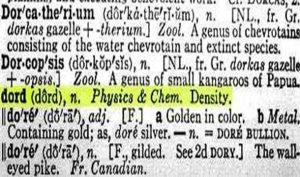
 We’re all used to seeing typos and grammar mistakes in published work.
We’re all used to seeing typos and grammar mistakes in published work.
Although, we tend to trust dictionaries completely. They’re the ultimate authority for publishers, authors, and Scrabble players.
Yet, even Websters has been known to oops.
On this day in 1939, it was discovered that the Websters New International Dictionary, Second Edition, did have a typo. A very embarrassing one.
They had included a word that didn’t exist.
Dord.
The original request for a new entry was actually meant to be “D or d” = Density, abbreviated. It was supposed to be a new meaning for the abbreviation, “D”, as used by chemists and physicists.
Instead, the typesetter ran the head word together, and created an entry for the non-word “dord”.
The proofers and editors didn’t question the entry.
Dord stayed in the dictionary for another ten years before someone noticed there was no etymology for the word and followed up.
Next time you spot a Websters in a secondhand shop, check for dord and see if you have found one of the few that carry that typo.